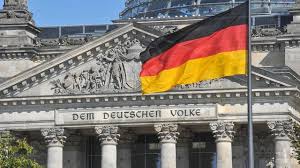German Economy Powers Euro Zone Growth, But Exports Cloud Picture
Monday 16 May, 2016 Written by REUTERS/FABIAN BIMMER
German economic growth doubles: The European powerhouse economy doubled its growth to 0.7 percent, up from the 0.3 percent in the final quarter of last year, Reuters reports. The rise is higher than expected, and it beats the Eurozone average estimate of 0.5 percent, which decreased 0.1 from the previous quarter. Increased private consumption has become the main propellor of German growth.
Germany's economy more than doubled its expansion rate in the first quarter as spending picked up, cementing its role as the growth engine for a region in which the effects of high-powered monetary stimulus appear to be gaining traction.
The euro zone's dominant economy grew 0.7 percent, its strongest quarterly rate since an identical reading in the first quarter of 2014 as higher state and household expenditure more than offset a dip in foreign trade, the Federal Statistics Office said on Friday.
The figure beat forecasts as well as a preliminary growth rate of 0.5 percent in the currency bloc as a whole announced by European statistics agency Eurostat in Brussels.
Separate national GDP data published on Friday showed quarterly growth accelerated to 0.3 percent in Italy and to 0.5 percent in the Netherlands.
For the German economy, private consumption has overtaken trade as the most important growth driver, with record-low unemployment, low interest rates and higher wages pushing households to spend more.
Also on Friday, Germany's biggest trade union, IG Metall, said it agreed a two-stage wage increase of 4.8 percent over 21 months, which analysts said should further boost consumption.
Investment in construction and capital goods rose, the statistics office said, boosted by relatively mild winter weather that had a similar impact in some other euro zone countries, while Europe's migrant crisis also played a role.
"It is likely that higher public expenditure contributed to growth in a number of countries, in some cases lifted by spending to deal with the influx of refugees (which was true of Germany)," Howard Archer, chief European economist at IHS, said of the Eurostat data.
Policymakers at the European Central Bank said the investment jump was unlikely to be a blip, supporting the bloc’s slow but steady recovery which the bank has underpinned with its stimulus programme.
RELATED COVERAGE
Buying 1.7 trillion euros ($1.93 trillion) worth of assets and cutting rates deep into negative territory, the ECB has pushed down borrowing costs for governments, businesses and households, hoping to kick-start spending to generate growth.
Though the ECB's ultra-loose monetary policy has been criticized by German politicians, economists linked it to the rise in consumption as well as a booming real estate sector.
SPEND, SPEND, SPEND
Germany's quarterly growth rate easily beat the 0.3 percent posted in the final three months of 2015, and was also higher than all but four of the euro zone states for which Eurostat published quarterly figures.
But the unadjusted year-on-year figure of 1.3 percent missed the Reuters consensus forecast of 1.5 percent, and the
economy ministry in Berlin said it expected German growth to slow.
That view was shared by economists, who said the impact of weaker exports - a trend fuelled by a stronger euro currency - would eventually be felt as demand from emerging markets ebbs.
"Trade remains the problem child because of weakness in emerging markets," said Sal. Oppenheim economist Ulrike Kastens.
Holger Sandte of Nordea added: "Growth will not remain so strong, but strong enough so employment continues to rise."
Related coverage
German economy minister urges higher spending as first quarter output highest in two years
Economy Minister Sigmar Gabriel said the government should increase investments, echoing calls by the International Monetary Fund (IMF).
"The German economy started 2016 on a good footing: industry posted an increase in production, employment is noticeably rising, and higher income of private households is leading to higher private spending," Gabriel said.
"Our task is to use this momentum to invest in education, modern infrastructure and innovation."
But ING economist Carsten Brzeski said the strong data might provide more ammunition for German politicians to resist calls by the IMF and the Organisation for Economic Co-operation and Development (OECD) to reform the economy.
The IMF has urged Germany to boost investment, and reform its labour market and pension system, while the OECD has also called for tax reductions.
"The strong growth performance also shows what currently is the biggest risk for the German economy: complacency," Brzeski said.
(Additional reporting by Gernot Heller in Berlin, Balazs Koranyi in Frankfurt and Philip Blenkinsop in Brussels; Editing by John Stonestreet)

Leave a comment
Make sure you enter all the required information, indicated by an asterisk (*). HTML code is not allowed.
Join
FREE
Here










